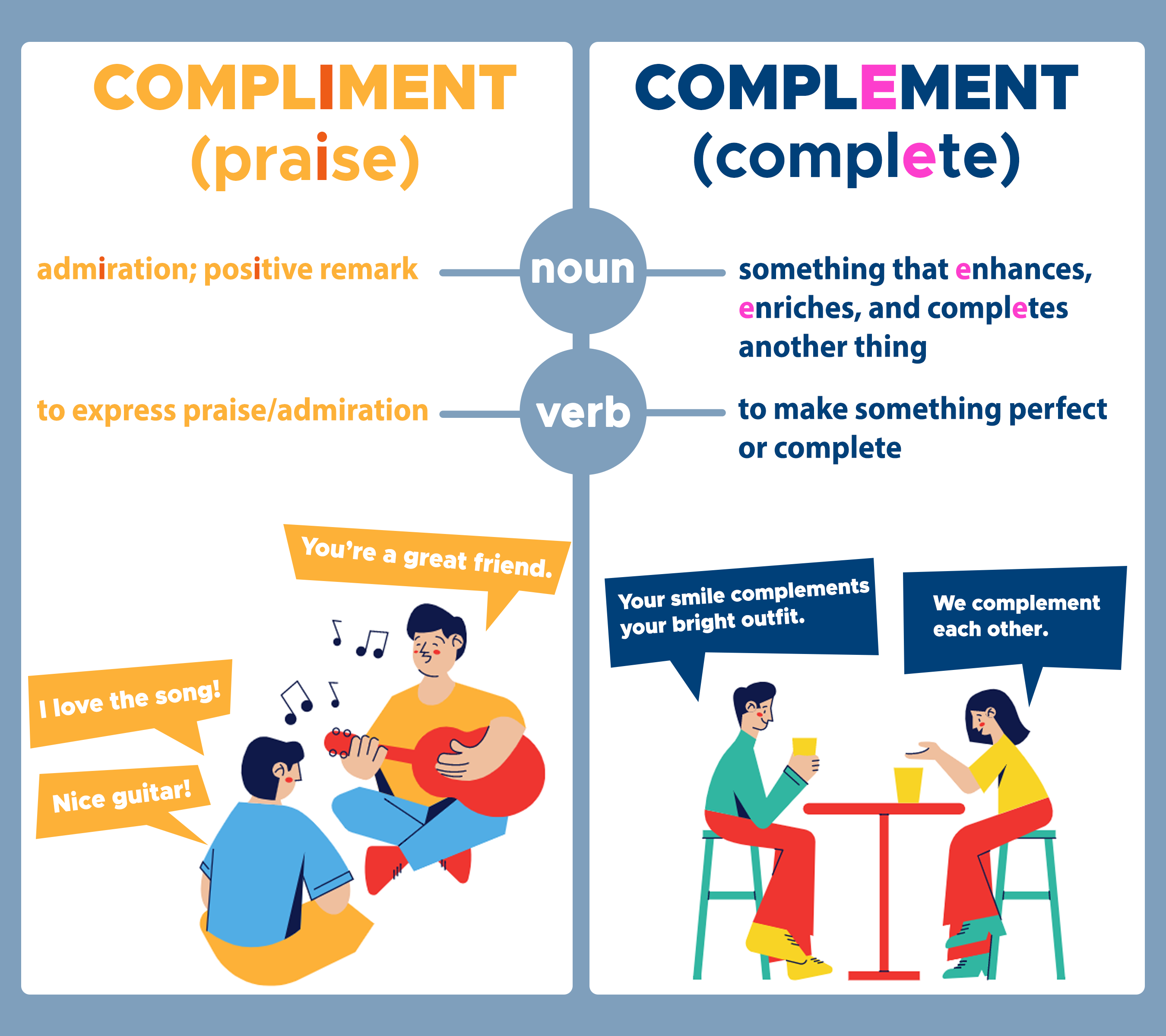Let’s learn about the difference between compliment vs complement.
The Difference Between Compliment vs Complement
“You look great!” is a compliment, but “Your red dress complements your figure” means your red dress enhances your figure or completes your look. Compliment and complement are commonly confused words mainly because they’re homophones – words that sound similar but have different meaning and spelling.
If you’ve ever confused these two words, don’t blame yourself but blame English instead. Just kidding! Here’s a quick guide to better distinguish between compliment and complement.
Related Reading: Which vs That – Introducing Clauses
Compliment Definition and Use
As a noun, a compliment is a remark of praise, admiration, or commendation, but as a verb, compliment means to express such praise or positive remark.
Here are example sentences with compliment used as a noun.
- She said I did great a job writing the report; her compliment made my day!
- Jacquie’s low self-esteem makes her reject any compliment.
- She leaves compliments more than complaints, and I love that about her.
Other examples of compliments are statements that communicate support or approval.
- I love listening to your podcast!
- What a beautiful painting!
- I like how your drawing complements the story. [This sentence is a compliment about how the drawing complements or completes the story.]
Complement Definition and Use
As a noun, a complement is something that enhances, improves, or completes another thing.
- Her friends are hilarious; their sense of humor is a complement to hers.
- Nathans’s culinary skill is a perfect complement to Dan’s refined appetite.
- A cup of hot coffee is a nice complement to a heavy meal.
As a verb, to complement generally means to make something complete or perfect; to add something that improves or enhances it.
- Choose a shade of her lipstick that complements your skin tone.
- You need a partner who complements your personality.
- The graphics that complemented the texts made the lesson easier to grasp.
- Do you think my necklace is complementing my dress?
Complement in Other Contexts
Complement is also used in technical contexts like grammar, mathematics, and science. In grammar, complement means a word or group of words that defines the subject or the object of the verb. For instance, the word smart in “She looks smart” is a complement to the subject she.
In science, a complement system is a group of proteins fighting infectious microorganisms. When talking about math, a complement refers to an element or an amount needed to complete a set. In geometry, two angles that form a right angle are called complementary angles.
Compliment vs Complement: Easy Trick to Distinguish Them
To remember the difference between compliment vs complement, zero in on letters E and I.
Associate the letter E of complete with the word complement (COMPLEMENT). Conversely, recall that a compliment is a praise as in “I look good!” Associate the letter I in praise or the I in “I look good” with the word compliment (COMPLIMENT).
In short, take the E of COMPLETE and associate it with COMPLEMENT; and take the I of PRAISE and connect it with COMPLIMENT.

Complimentary Vs. Complementary
Complimentary and complementary are both adjectives. Complimentary means “expressing a compliment or approval.” It can also mean “free of charge.” Complementary refers to completing, improving, or perfecting the qualities of another thing.
- Rita brought home all the complimentary supplies from the hotel.
- She was always complimentary about her daughter’s artistry, but her daughter still didn’t believe in herself.
- He wore the black suit with a complementary bowtie during the ceremony.
- I think the complementary outfits the couple wore during the recital were cute.
Compliment vs Complement Exercise:
Fill in the blanks with the correct form of the words in parentheses.
- Edward ______ (complimented, complemented) her designs during the presentation.
- We gave her a ______ (compliment, complimentary, complementary) massage to make up for the mix-up in schedule.
- She loves ______ (complementing, complimenting) strangers everywhere she goes.
- The ______ (complimentary, complementary) colors in the painting perfectly ______ (compliment, complement) the artist’s personality.
- I’m not sure if his remark about my hairstyle was a ______ (complement, compliment) or an insult. Do you think his words and gestures were ______ (complementary, complimentary)?
Answers:
- Edward complimented her designs during the presentation.
- We gave her a complimentary massage to make up for the mix-up in schedule.
- She loves complimenting strangers everywhere she goes.
- The complementary colors in the painting perfectly complement the artist’s personality.
- I’m not sure if his remark about my hairstyle was a compliment or an insult. Do you think his words and gestures were complementary?
Thank you for reading. We hope it’s effective! Always feel free to revisit this page if you ever have any questions about the difference between compliment vs complement.

